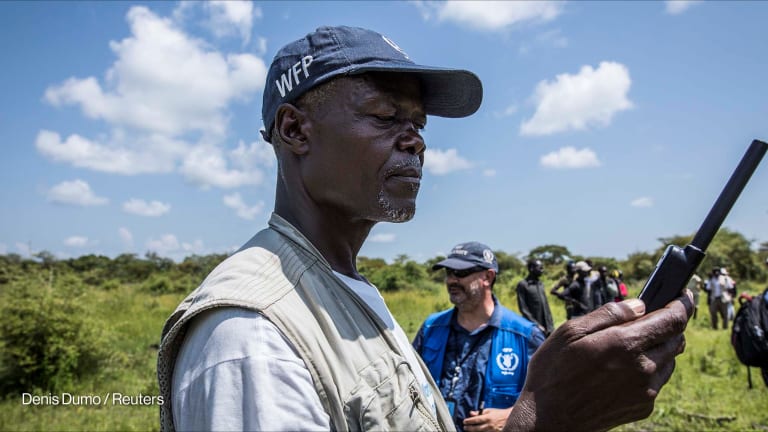Doing business with the Climate Technology Center and Network
In business for more than a year, this U.N. office provides technical assistance for climate technology projects in developing countries. So how can the private sector get involved? We spoke with the Climate Technology Center and Network's director.
Across the global development community, there is growing recognition that technology transfers to developing countries are a key element of international efforts to combat climate change. On Friday, more than 190 nations agreed on a formal negotiating text for the widely anticipated 2015 global climate agreement, which underscored technology transfer as a collective goal. That agreement is expected to be finalized at the COP21 global climate negotiations in Paris at the end of the year. Little noticed, however, is that the U.N. system already has an operational mechanism for technology transfers — the Climate Technology Center and Network. First floated at COP15 back in 2009 and then declared “open for business” four years later at COP19, CTCN is mentioned in the COP21 negotiating text as a key institutional arrangement for technology transfer. Housed under the U.N. Environment Program, the CTCN is run out of an office of just 10 people in Copenhagen, Denmark. CTCN has a small budget — about $50 million — funded mainly by Norway, Denmark, Japan, Canada and the United States. The size and budget of the small outfit belie its threefold mission: technology transfer, knowledge sharing and networking. CTCN’s mandate, however, limits the network to pure technical assistance in the range of $50,000 to $250,000 per project request. No money can be disbursed toward the project. How developing countries can tap CTCN support According to CTCN Director Jukka Uosukainen, the application process for CTCN support is “totally open” with no conditions. To participate, developing countries must establish an in-country CTCN contact, called the nationally designated entity. These NDEs manage the process of applications for technology transfer project requests, Uosukainen explained. NDEs tend to be ministries and departments of environment or university departments of natural sciences. At last count, there are 107 NDEs around the world. Within each developing country, parties interested in a technology transfer then approach the NDE, which subsequently submits a project request form to CTCN staff. CTCN evaluates the project’s needs, including estimated costs. If a technical assistance project is valued at $50,000 or below, it would most likely be handled remotely by a technical resource pool of 11 designated “centers of excellence,” Uosukainen said. The Asian Institute of Technology in Thailand and the National Renewable Energy Laboratory in the U.S. are two examples. The assistance is free to the requesting party in the developing country. If the project is valued in the $50,001 to $250,000 range, CTCN staff would outsource the technical assistance work to its network of private sector partners. As with lower-value projects, no fee is assessed even if a private sector partner is involved. CTCN’s mandate ends once a contract is awarded to a private sector firm, and implementation begins. The entire process is completed within six months, a year maximum. “We can start working with [the interested parties] within a few weeks [of a project request],” the CTCN director explained. “In a couple of months, we have a team that’s assembled. And, in half a year — maximum a year, we should get out. It’s technical assistance not implementation. It’s a bit difficult and challenging in the U.N. system, but we can do it.” As of December 2014, the CTCN had 20 open projects in developing countries with 10 more in the process of being requested. Uosukainen is keen to see an increase in these numbers as the Paris climate agreement nears, and especially in the pre-2020 phase before the agreement is ratified. How the private sector can get involved Companies focusing on development and deployment of climate technologies are eligible to apply to join the CTCN network for free, at any time, as long as they agree to comply with CTCN rules. Only after their application is approved can private sector firms submit proposals to support country requests for technical assistance. Proposals will be judged against technical criteria in line with U.N. procurement standards, as well as the regional expertise of the bidder. CTCN members are allowed to submit joint proposals. CTCN does reserve the right to engage with firms outside its network when necessary to support a country request. CTCN’s Uosukainen emphasized that it releases payments much faster than a traditional U.N. contract — an inviting proposition for many prospective private sector partners. “Others may have more money,” Uosukainen said, “but we are the fast mover … that's our niche.” Read more international development news online, and subscribe to The Development Newswire to receive the latest from the world’s leading donors and decision-makers — emailed to you FREE every business day.
Across the global development community, there is growing recognition that technology transfers to developing countries are a key element of international efforts to combat climate change.
On Friday, more than 190 nations agreed on a formal negotiating text for the widely anticipated 2015 global climate agreement, which underscored technology transfer as a collective goal. That agreement is expected to be finalized at the COP21 global climate negotiations in Paris at the end of the year.
Little noticed, however, is that the U.N. system already has an operational mechanism for technology transfers — the Climate Technology Center and Network. First floated at COP15 back in 2009 and then declared “open for business” four years later at COP19, CTCN is mentioned in the COP21 negotiating text as a key institutional arrangement for technology transfer.
This story is forDevex Promembers
Unlock this story now with a 15-day free trial of Devex Pro.
With a Devex Pro subscription you'll get access to deeper analysis and exclusive insights from our reporters and analysts.
Start my free trialRequest a group subscription Printing articles to share with others is a breach of our terms and conditions and copyright policy. Please use the sharing options on the left side of the article. Devex Pro members may share up to 10 articles per month using the Pro share tool ( ).
Mythili Sampathkumar is a New York-based journalist covering development, the U.N., foreign policy, and U.S. politics. Her work has appeared in outlets like The Independent, LA Times, NBC News, Foreign Policy, Vox, and PRI.








